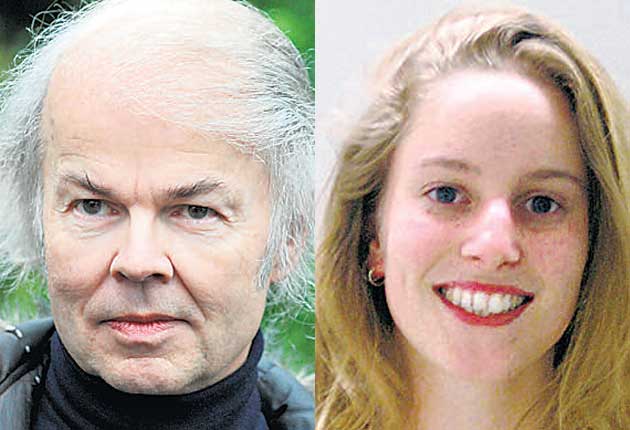Police send 'letter of exoneration expressing regret' to Christopher Jefferies - the innocent landlord of murdered Joanna Yeates
Innocent landlord of murdered landscape architect hails 'public vindication' over handling of his detention, bail and subsequent release without charge in December 2010

Avon and Somerset Police have written a letter to the innocent landlord of murdered Joanna Yeates expressing “regret” over the way he was treated after being arrested over her killing.
Christopher Jefferies hailed the letter as a “public vindication” from the force over its handling of his detention, bail and subsequent release without charge in connection with the landscape architect’s death in December 2010.
The “letter of exoneration expressing regret” from chief constable Nick Gargan - who met the retired teacher last Friday - acknowledged the “hurt” caused to the 68-year-old retired teacher when the force failed to clear him publicly of suspicion over the 25-year-old’s murder when releasing him from bail in March 2011.
Mr Jefferies said: “It provides an important conclusion to the whole aftermath of what I had to go through following my arrest.
“As the letter itself explains it provides the public vindication which was not given at the time I was released from police bail.
“Although the letter is addressed to me and is therefore expressing regret at what I had to endure, the letter also implicitly provides the public acceptance that the events didn't just affect me but affected a large circle of my relatives and friends.”
Mr Jefferies was arrested on December 30 2010 and questioned by detectives for two days before being bailed after Miss Yeates was found dead on Christmas Day.
Dutch national Vincent Tabak, who lived next door to her and her boyfriend Greg Reardon, 27, at 44 Canynge Road, Bristol, was jailed for life in October 2011 for her murder.
Mr Jefferies won damages from eight newspapers over stories about him after his arrest.
As well as paying damages to the former Clifton College teacher, the publishers of the Mirror and the Sun were respectively fined £50,000 and £18,000, plus legal costs after being found guilty of contempt of court.
During Tabak's trial it was revealed the killer had implicated Mr Jefferies by phoning the police and making false claims.
Mr Gargan joined Avon and Somerset from the the National Policing Improvement Agency in March, replacing Colin Port, who was in charge at the time of the murder.
In his letter to Mr Jefferies, Mr Gargan said the pensioner's arrest was an “integral step” in the investigation, but added: “I accept unequivocally that you played no part in the murder and that you are wholly innocent of the crime.”
He added: “I understand the length of time you spent on police bail caused you significant distress and inevitably prolonged the period of time when you remained in the public eye as someone who was still suspected of involvement in an appalling crime.
“The police did not make it clear publicly that you were no longer a suspect in the investigation as soon as you were released from bail on March 5, 2011.
“While it is not normal practice to make such a public statement, in the circumstances of the exceptional media attention your arrest attracted I acknowledge we should have considered this and I am very sorry for the suffering you experienced as a result.”
He also said that all DNA, fingerprints and photographs taken of Mr Jefferies after his arrest had been destroyed.
In a statement Mr Gargan said the force stood by the decision to arrest the landlord.
“The media attention and vilification to which Christopher Jefferies was subjected during the Joanna Yeates murder investigation was unprecedented, and I understand how difficult it must have been for him,” he said.
“It was a complex investigation, carried out under the most intense public scrutiny and the investigating officer had to pursue every reasonable line of enquiry.
“Although I was not chief constable then, I stand by the decision taken at the time to arrest and interview Christopher Jefferies.
”Nevertheless I am happy to accede to his request that we should make it clear that he was completely exonerated in this investigation.
“This is an unusual step to take but these were exceptional circumstances.
“I had a private meeting with Mr Jefferies on Friday and hope to use his experience to inform our serious crime investigations in the future.”
Mr Jefferies gave evidence at the Leveson Inquiry into press standards, with its final report saying reporting around the former teacher's arrest had been “unbalanced, prejudicial and wildly inaccurate” and calling him “the victim of a very serious injustice perpetrated by a significant section of the press”.
Mr Jefferies also released a letter today, sent to him by Mr Port in January last year, denying Mr Jefferies' name had been deliberately released to the media.
It was sent after Daily Mirror editor Richard Wallace told the Leveson Inquiry police had given off-the-record briefings in which they appeared confident that Mr Jefferies “was their man”.
In the letter, referred to by Mr Jefferies in his Leveson witness statement, Mr Port said the editor's evidence was “untrue”, adding: “There was an inadvertent disclosure of your name following news reports naming you but as soon as we discovered this had taken place we made it clear to the journalist the information should not have been released and should not be used.”
Subscribe to Independent Premium to bookmark this article
Want to bookmark your favourite articles and stories to read or reference later? Start your Independent Premium subscription today.
